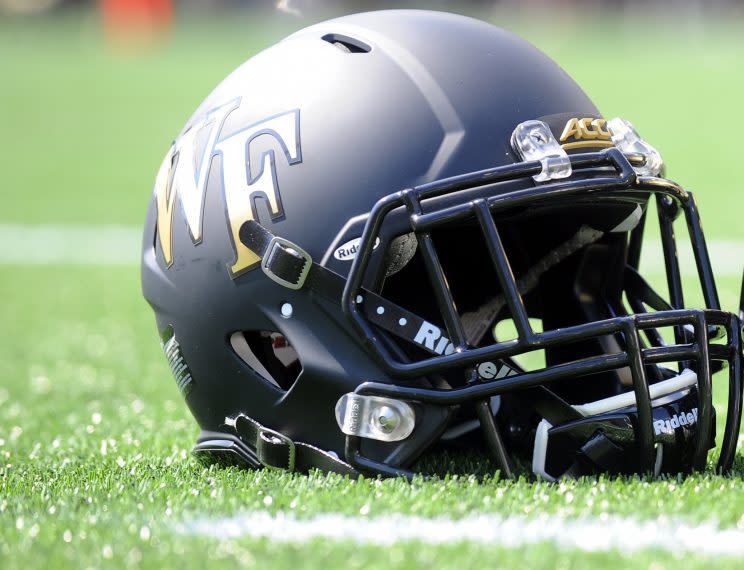Would your coach use leaked game plan if given the opportunity?
While Louisville fails to justify its involvement in WakeyLeaks, as the bizarre Wake Forest playbook sabotage episode has come to be known, others in the college football coaching fraternity would like to make a statement.
That statement: We’re not all like the Cardinals.
Not every coach would have accepted pirated information on an upcoming opponent if it were presented to him. Louisville athletic director Tom Jurich acknowledged Wednesday that co-offensive coordinator Lonnie Galloway received “a few plays” from former Wake Forest radio analyst Tommy Elrod before the Cards played the Demon Deacons on Nov. 12.
[Also from Pat Forde: Breakdowns and predictions for every bowl game]
This was followed by wide public presumption that, hey, everybody does it. In a sport where wind screens cover practice fields and coaches cover their mouths when speaking into their headsets, the paranoia is rampant. Thus, the reasoning goes, of course any college coach worth his practice whistle would do whatever it takes to get an advantage.
Maybe not.
“To characterize this as normal behavior by coaches?” said Big Ten Network analyst Gerry DiNardo, formerly the head coach at Indiana, LSU and Vanderbilt. “I don’t think that’s fair. I don’t think that’s accurate.”

DiNardo has stories.
In 1999, his LSU team was preparing to host No. 10 Georgia. DiNardo had an open-door practice policy – it wasn’t difficult at all to get into the Tigers’ practice fields during the week. Turns out it was too open.
During that week, Georgia coach Jim Donnan called DiNardo. The two had been friendly since their days as offensive coordinators in the old Big Eight Conference – Donnan at Oklahoma and DiNardo at Colorado. Now, Donnan wanted DiNardo to know he had a “security breach,” to use Wake Forest coach Dave Clawson’s modern term.
Someone who had attended those LSU open practices had sent the Georgia staff information on what he had seen. Donnan blew the whistle to his competitor.
“I just called up Gerry and told him,” Donnan said. “I felt like he needed to know what was going on and understand who had access to practice.”
The next day, DiNardo changed his practice policy. He reduced access, and those who were allowed to attend had to sign a waiver saying they would not disseminate practice information.
(LSU lost the game, 23-22, on a failed two-point conversion. DiNardo was fired later in the season.)
DiNardo had another story, one his boss at Colorado, Bill McCartney, told the staff. It dated to McCartney’s days on Bo Schembechler’s staff at Michigan, alongside Gary Moeller (the two worked together under Bo in 1980 and ’81). Before one game, someone sent Michigan a list of formations that week’s opponent planned to run.
The formations were presented to Moeller, the defensive coordinator. He refused to look at them.
As McCartney told it, that week’s opponent came out for the first series in a formation Michigan had not seen or prepared for and drove for a touchdown. But Moeller made sideline adjustments and the Wolverines won the game. Afterward, he looked at the information that was sent to Michigan and it showed the exact formation the opponent opened the game with.
So, are there honorable coaches who wouldn’t want to win with unethically obtained information? Apparently so.
“I think the majority would [decline such information],” Ohio State coach Urban Meyer said Thursday. “But I’m not here to judge.”
Regardless of how you feel about Louisville’s conduct, the opinion of what Elrod allegedly did to sell out his alma mater and employer is unanimous in the coaching fraternity.
“Shameful,” Meyer said.
While that sort of internal subterfuge would seem extremely rare, it has heightened insecurities in an already insecure profession. One coach who is transitioning to a new head-coaching job has already asked his new boss to be aware of any employees on the way out who might be considered security risks.
Of course, coaches wouldn’t come with a built-in paranoid streak if there weren’t reasons for it. A sport that is heavily dependent on out-scheming the opponent is naturally susceptible to attempts at game plan espionage.
From practice spies to stolen signals, football has a long history of covert operations, and efforts to counteract it.
During his playing days at Notre Dame in the early 1970s, DiNardo remembers Fighting Irish coach Ara Parseghian having managers tape over holes in the fence around the practice field to deter snoops. And years after Donnan’s four-season stint as an assistant coach at North Carolina in the 1970s, he heard from former rivals how they spied on the Tar Heels.
Turns out the school library overlooked Carolina’s practice fields at the time, and opponents would send in scouts posing as UNC students to chronicle everything they saw.
Those stories are part of the lore of the sport, and often are laughed off in the re-telling. But you can be sure nobody at Wake Forest is laughing in the direction of Louisville’s staff, or any other programs that acquired game plan information from Elrod. It isn’t funny when it’s happening to you.
And as Gerry DiNardo and others would like a cynical world to know, not every college football coach would do what some at Louisville did to Wake Forest.
Popular college football video on Yahoo Sports:

